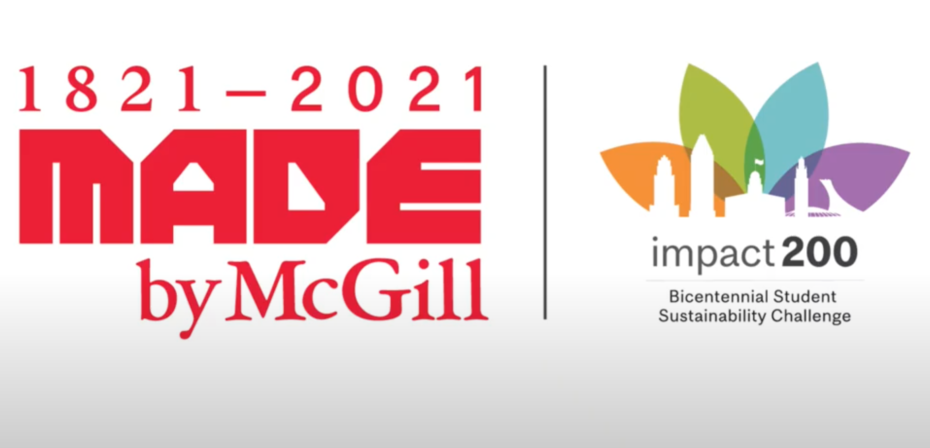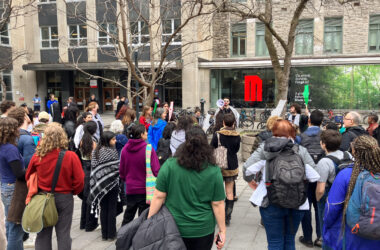Launched in August 2020 as part of McGill’s bicentennial celebrations, impact200 is a challenge that invites teams of students to submit proposals for projects to enhance sustainability on campus, in Montreal, and around the world. The challenge was organized by the Bicentennial Office in collaboration with the McGill Dobson Centre for Entrepreneurship, the McGill Office of Sustainability (MOOS), the McGill Sustainability Systems Initiative (MSSI), and representatives of the Faculty of Agricultural and Environmental Sciences. On Dec. 2, the winners of the challenge will be announced, with prizes ranging from $2,000 to $10,000. Once completed, the finalist teams will be offered the opportunity to refine their project through a training program provided by the Dobson Centre and to ultimately bring it into action if it places in the top three spots.
Each project aims to address one or more of the United Nations Sustainable Development Goals, such as food security, eradication of poverty, and climate action. From the 44 initial proposals, 10 finalists were selected to develop the feasibility of their concept over the summer and then deliver a final presentation of their project in November. The university’s flagship Sustainability Projects Fund (SPF) gave each finalist $5,000 to cover the project’s development expenses and connected each project with mentors for support.
Frédérique Mazerolle, McGill media relations officer, said that the university was pleased to foster sustainable solutions for local and global challenges being innovated at McGill.
“Sustainability is an institutional priority at McGill, as evidenced by the ambitious goals we have set out for ourselves in the Climate & Sustainability Strategy 2020-2025,” Mazerolle wrote. “It is our responsibility as members of the global community that we do what we can to achieve these goals to reduce our impact on climate change and contribute positively to the sustainability of the planet.”
Simon Cleghorn, U1 Engineering and co-founder of the team 200 Urban Garden—one of the 10 finalists—explained that their project aims to make cities more sustainable by converting underutilized parcels of land into vibrant community green spaces.
“The initiative gave us a rare opportunity as students to create and pursue a sustainable innovation with external funding,” Cleghorn wrote to the Tribune. “As six environmentalists, this was extremely exciting for us. Impact200 allowed us the opportunity to engage with other like-minded students with similar goals pertaining to sustainability.”
Two other finalists, McGill Mycelium Project and FoodMap, attempt to promote sustainability by responding to food insecurity. Another, SOlar-A, designed water filtration backpacks to ensure areas with low resources have access to clean water through solar and biomechanical energy. McGill Engineers in Action plans to design a footbridge for rural communities in Bolivia or Eswatini, to then have a group of students work alongside these communities to develop it. The other finalists were teams Algo, CoolHealth, MentalLingual, MiniWaste, and unEarth.
Joining forces in September 2020, Cleghorn and his team decided to participate in impact200 with the goal of implementing sustainable gardens on McGill’s downtown campus.
“We began planning our proof-of-concept Wong Garden and formulating the vision of ‘200 Urban Garden’ at weekly meetings all throughout the 2020-2021 academic year,” Cleghorn said. “This past summer we successfully constructed the Wong Garden, which includes various forms of green technology and a wide range of produce.”
Gérald Cadet, director of bicentennial planning at the Office of the Principal & Vice-Chancellor, explained that the winning projects would be chosen based on the quality of each team’s final pitches, the applicability of each project to the SDG goals, and the project’s ability to create transformative and beneficial futures. “The judges considered many criteria, among which [was] the potential to become Bright Spots, that is, projects that transform some piece of the world for the better, clarity of the proposal, etc.,” Cadet wrote to the Tribune. “The challenge is likely to be a one-time; however, through one of the components of the Dobson Cup, students can propose sustainability-focused projects.”









